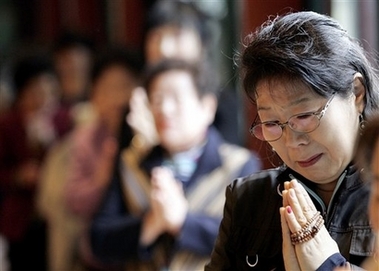Top News
Sympathy and shame in South Korea
(AP)
Updated: 2007-04-21 09:45
 |
Large Medium Small |
SEOUL, South Korea - The reaction to the Virginia Tech massacre in the nation where the shooter was born has been an outpouring of sympathy mixed with feelings of shame. There are also concerns that going too far in apologizing would make it appear South Korea is unjustifiably taking some blame for the killings.
Expressions of regret have ranged from candlelight vigils and religious services to online tributes. South Korea's ambassador to the U.S. proposed the idea of Koreans living in America taking turns in a 32-day fast to honor each of the victims.
President Roh Moo-hyan has expressed condolences four times -- the first before it even emerged the culprit was a South Korean immigrant, followed by words of sympathy to the American people and to President Bush.
"This is a sensitive time," the leading Chosun Ilbo daily cautioned in an editorial. "We must ensure that our true intentions, to share the sorrow, can travel across the ocean and reach the hearts of grieving Americans."
Seung-Hui Cho left South Korea as a boy and lived in the United States for more than 14 years, where he apparently grew into a deeply troubled young man whose murderous spree was facilitated by easy access to guns.
Much of the reaction to Cho's nationality in his native land is colored by South Korea's keen awareness of its national image. South Korea is obsessed with how it is perceived by the outside world, and its group-oriented culture means the achievements of the few are marshaled into rallying cries for the many.
"Koreans think very much in terms of national identity rather than individual identity," said Michael Breen, author of the book "The Koreans: Who They Are, What They Want, Where Their Future Lies."
South Koreans are quick to take group credit even from afar. The most notable recent example is Pittsburgh Steelers' wide receiver Hines Ward, the offspring of an African-American father and Korean mother, who was feted as a national hero after he was named Most Valuable Player in the 2006 Super Bowl -- even though he and American football were virtually unknown here before.
But that sense of collective pride has also meant Koreans fear facing group reprisal after Cho's shooting spree.
There are worries about everything from personal assaults to possible fallout for a proposed free trade agreement between Seoul and Washington or long-held hopes of relaxed U.S. visa requirements for South Koreans.
The deputy head of the U.S. Embassy in South Korea reassured Koreans in a speech Friday they should not feel any collective guilt and that the shooting would have no bearing on U.S.-South Korean ties -- forged after American forces came to South Korea's defense in the 1950-53 Korean War.
"This tragic incident will have no influence on our bilateral relationship. It was an act of one individual," said Deputy Chief of Mission William Stanton.
Part of the reason South Koreans may express fears of reprisals is because of what could have transpired had the situation been reversed and an American student went on a rampage at a South Korean campus, noted Breen.
For example, when two girls were killed in a traffic accident involving a U.S. military vehicle in 2002, South Korea was gripped with anti-American fervor whipped up by mass protests. The mood was fanned by politicians seeking a boost in that year's presidential vote that brought Roh to power with a promise not to "kowtow" to the U.S.
Since Monday's shootings, however, there have been no signs of any reprisals against Koreans in the United States.
"It will be very instructive to Koreans to watch the reaction of Americans," Breen, a Briton, said of the response to the shooting rampage. "They know it's more gracious than their own reaction would be."
The shooting story has been the top news this week in all South Korean media -- as it would be even in the absence of a Korean connection, given the scale of the massacre that has shaken the country's key ally.
Media here have also reported on the rest of the world's coverage of the event, and appeared to display a sense of relief that their reporting focused on U.S. gun culture along with Cho's psychological problems as the main factors behind the rampage.
The shootings have also led South Korea to embark on some soul-searching about its children and the ever-increasing pressures they face amid cutthroat competition at school. Writing in the Hankyoreh newspaper, columnist Sin Ki-sup said there were other young people like Cho who are "lost in despair and rage" and called on parents to help.
"The beginning of a solution will be the recognition that the dreams of young people are in a state of collapse," Sin wrote. "Dreams that have collapsed might not be revivable, but if we share their pain, we might help them begin to dream new dreams."
| 分享按钮 |

